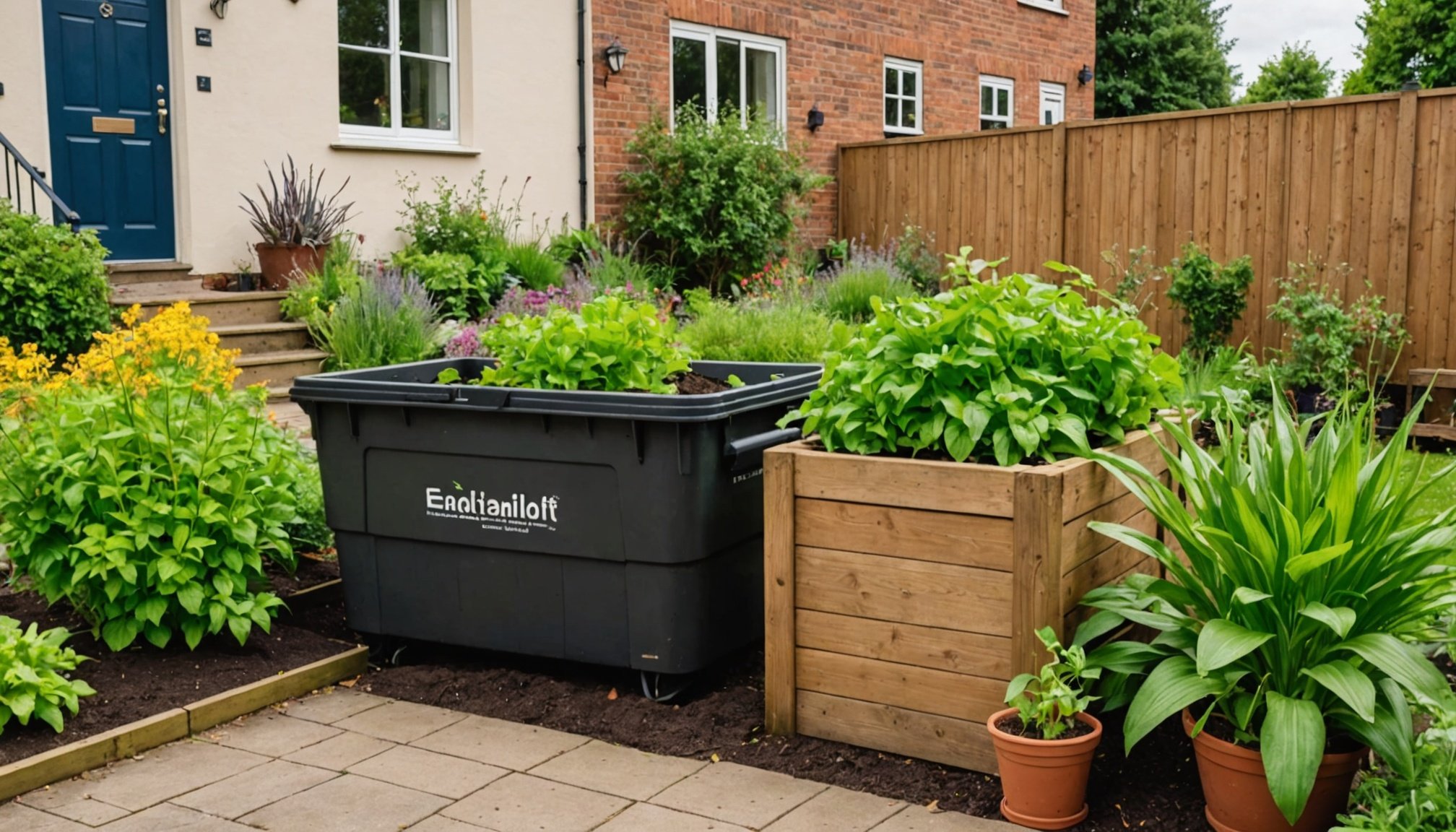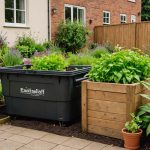Introduction to Composting in Small Spaces
Composting for small gardens is not only an answer to waste reduction but a boost to sustainability in townhomes. In compact urban environments, the benefits of composting are substantial. It helps transform kitchen and garden waste into nutrient-rich soil, ideal for small gardens. This eco-friendly practice enhances the life of your plants while encouraging more sustainable living.
The rise in sustainability in townhomes highlights the need for incorporating eco-friendly practices into everyday life. Composting acts as a critical component of this lifestyle change, offering a simple and effective way to promote green living. By turning organic waste into valuable resources, you’re contributing to a cleaner environment and a more sustainable planet.
Also read : Ultimate guide for uk homeowners: designing your landscape to withstand floods
The overview of compact garden solutions reveals various composting options for limited spaces. From balcony setups to mini garden plots, the ability to compost efficiently hinges on understanding your specific needs and constraints. This ensures that composting becomes a feasible, practical practice in any setting, regardless of space constraints, reinforcing an eco-friendly lifestyle.
Affordable DIY Compost Bin Ideas
Creating a DIY compost bin is a budget-friendly way to start composting right at home. By using household items like old containers, wooden pallets, or even plastic storage bins, you can create an effective composting system. Common materials include:
Also read : Elevate your uk basement: create an unforgettable home theater in low ceilings
- Plastic bins: Drill holes for ventilation.
- Wooden pallets: Construct a simple, open-air bin.
Once you gather your materials, follow this step-by-step guide to build your small bin:
-
Select a Location: Choose a site in your yard or balcony with adequate sunlight.
-
Prepare the Bin: For plastic bins, ensure proper drainage by adding small holes at the bottom.
-
Layering: Start with a layer of coarse materials, like sticks or twigs, for airflow.
-
Add Compostable Materials: Alternate layers of green materials (like kitchen scraps) and brown materials (like dried leaves).
-
Maintain: Turn the compost regularly to aerate.
To maximise your composting efficiency in limited space, keep your bin manageable and ensure a balanced mix of materials. Monitoring moisture and turning the pile frequently will help manage any odours or pests, and you’ll be well on your way to creating nutrient-rich compost. By embracing these compost bin ideas, you’re taking a significant step toward effective waste management and environmental stewardship.
Best Composting Methods for UK Townhomes
Composting methods are diverse, but not all are suited to the compact nature of UK townhomes. Picking the right method can greatly enhance the efficiency of composting efforts. Among the popular methods are Bokashi composting and vermicomposting.
Bokashi Composting
This method involves fermenting organic waste using a special inoculant, allowing it to break down quickly. Pros include its compactness and ability to process a wide range of kitchen scraps, including dairy and meat. Cons, however, might be the initial cost of purchasing the inoculant and managing an acidifying leachate.
Vermicomposting
Utilising earthworms to break down organic material in a controlled environment, vermicomposting is both effective and low-odour. The pros are that it’s ideal for indoor setups, producing high-quality compost. However, the cons include their sensitivity to temperature changes and the need for careful management to avoid overwhelming the worms.
Choosing the right method largely depends on the garden size, available space, and personal preference. Residents should evaluate their unique situations—factoring in the amount of kitchen waste generated and the time they can dedicate to composting methods—to ensure maximum benefit and sustainability.
Suitable Compost Ingredients and Materials
Creating a thriving compost pile requires attention to compostable materials. For urban gardeners, it’s crucial to understand what goes into the bin. Start with kitchen waste like fruit peels, eggshells, and coffee grounds. These provide the necessary “green” nitrogen-rich material. Complement this with “brown” materials such as garden waste like dried leaves, straw, or small twigs, which supply carbon.
Balancing these materials is essential. Ideally, aim for a mix of one-third green and two-thirds brown. This ratio fosters the microbial activity needed for successful decomposition. Using diverse kitchen scraps can further enhance your compost’s quality by adding various nutrients. But be cautious: avoid adding meat, dairy, or oily foods, as these can attract pests and produce odour.
Adding occasionally shredded paper or cardboard can aerate the pile, accelerating the breakdown process. Turn the pile regularly to promote even decomposition and prevent stagnant patches. With these compostable materials in mind, your small garden can thrive, providing you with a rich medium to support your plants, while managing waste effectively. Thus, composting becomes an integral part of a sustainable lifestyle.
Tips for Successful Composting in Small Gardens
Effective composting in compact spaces requires keen attention to detail. Adhering to some simple composting tips enhances your small garden’s success. Begin by managing odour and pests effectively. Regularly turning your compost pile aids in aeration, preventing anaerobic conditions that often produce unpleasant smells. Layering helps too; alternating between green materials like vegetable scraps and brown materials such as dried leaves offers balance. Cover kitchen waste with soil to deter pests, which keeps the environment hygienic.
Implement space-saving strategies by using small space gardening techniques. Vertical composting systems, for example, work well in restricted areas. They’re designed to stack upwards, freeing valuable ground space. Utilise netting or sacks for storing brown materials nearby—an efficient solution for urban gardens.
Incorporating time-saving practices into daily life is key. Set aside specific times each week for maintaining your compost pile; consistent attention reduces workload in the long run. Quick and effective solutions like chopping larger waste into smaller pieces accelerate decomposition. There’s no need for extra gadgets or complex setups—just a few clever strategies, and composting success can be within your reach!
Local Resources for Composting Support
In urban areas, accessing composting resources can significantly enhance your composting journey. Community gardens serve as valuable hubs for like-minded individuals to come together and share composting tips and advice. These spaces not only allow you practical insights but also demonstrate real-world applications of composting practices.
Finding local workshops that offer composting education is an excellent way to improve your composting skills. These workshops provide hands-on training, from creating your own DIY compost bins to understanding different composting methods like Bokashi and vermicomposting. Look for events at community centres, universities, or online platforms dedicated to urban sustainability.
Community gardens play a critical role in supporting urban composting efforts by providing shared spaces for garden enthusiasts. They offer a communal setup where resources and knowledge can be pooled together, fostering a sense of community while promoting environmental stewardship. These gardens often have designated composting areas that illustrate effective composting in practice.
Utilising these local resources not only boosts your composting success but also connects you to a network of eco-conscious individuals. By engaging with these communities, you’re contributing to the broader movement towards sustainability and waste reduction in urban settings.
Environmental Benefits of Composting
Composting offers significant environmental advantages, especially in urban areas with limited gardening space. By turning organic waste into nutrient-rich compost, residents can drastically reduce the amount of waste sent to landfills. This simple act of waste reduction not only minimises the burden on landfill sites but also decreases the production of harmful greenhouse gases, thus actively contributing to a cleaner, more sustainable environment.
In the context of townhomes, where space is at a premium, the practice of composting aligns seamlessly with sustainable practices. This eco-friendly approach supports local ecosystems by replenishing the soil with natural nutrients and improving its overall health. Compost enhances soil structure, increases water retention, and promotes the growth of beneficial microorganisms, leading to healthier gardens and reduced need for chemical fertilisers.
Community engagement plays a pivotal role in magnifying these benefits. Community gardens and educational workshops bring neighbours together, supporting shared knowledge and collaborative efforts in composting. By fostering a sense of community responsibility, these initiatives can inspire more sustainable practices and encourage accountability in local waste management. Embracing composting at home and within the community not only supports individual sustainability goals but also contributes to broader environmental well-being.











